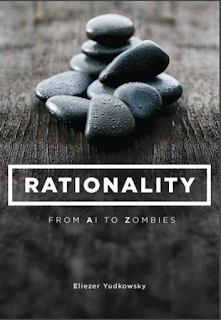Ethics: Is religion a reliable source for ethics?
For 2016 I have decided to do a study on ethics - from both theistic and non-theistic points of view. I reached out on Facebook for recommendations on where to find sound sources for the non-theistic side. One of the first things I am reading, from the non-theistic recommendations I obtained, is Eliezer Yudkowsky's Rationality: From AI to Zombies.
I am on chapter 17, and so far I really like the book (based on a series of blog posts he did between 2006 and 2009 on two blogs: Overcoming Bias and Less Wrong). However, I took exception with some of his claims about the Bible in chapter 16, not because I wish to argue, but because I desire to find the truth for myself, and I find a hiccup with this part of his thesis. I admit that as I read further, perhaps my questions along the way will resolve themselves. But for the time being, I will post them here. Yudkowsky says,
Second, religion exists not so much apart from, but within culture. This is because the people who practice religion do so not apart from, but within culture. And this is exactly what Yudkowsky seems to be stating: Religion is part of, not ABOVE/transcendent to, culture; therefore, it is not a blueprint for metaethics.
But, as Scripture (and culture!) develops, certain changes come about...especially with the teachings of Jesus (New Testament). God is no longer just a brooding entity throwing lightning bolts from the top of Sinai, or demanding that women who wear men's clothes be stoned. GOD IS LOVE (1 John 4:8, 16). People ask Jesus which of the Sinai commandments is the best, and He says, "'You shall love the Lord your God with all your heart, and with all your soul, and with all your mind.' This is the greatest and first commandment. And a second is like it: 'You shall love your neighbor as yourself.' On these two commandments hang all the law and the prophets" (Matthew 22:36-40).
This ethic IS transcendent to culture. Cultural norms can be ugly and selfish and are certainly unjust. But Jesus put the ethic of love in place - love of other above oneself, in fact (which is also unjust, but in a different way!). This is contrary to natural selection and survival of the fittest (which are just, but in a cold way. ...But I digress...).
As a follow-up thought, the Bible in the New Testament says for itself that the Old Testament served as a metaphorical tutor, to show the need for the New Testament and Christ (see Galatians 3:24).
But I guess one could argue that love is the transcendent value here, and not religious morality. ...But what about when God IS love?
I am on chapter 17, and so far I really like the book (based on a series of blog posts he did between 2006 and 2009 on two blogs: Overcoming Bias and Less Wrong). However, I took exception with some of his claims about the Bible in chapter 16, not because I wish to argue, but because I desire to find the truth for myself, and I find a hiccup with this part of his thesis. I admit that as I read further, perhaps my questions along the way will resolve themselves. But for the time being, I will post them here. Yudkowsky says,
First, I can think of two places off the top of my head where the Old Testament does in fact wonder about the complexities of the universe: Job 38-41 and Psalm 139:13-18. The Old Testament also celebrates/wonders at the beauty of human love in all its forms (take Song of Solomon, for example, or Hosea, or 1 Kings 3:16-27, where King Solomon counts on the extremity of a mother's love to rule on which woman is the real parent of a baby in question).“Not only did religion used to make claims about factual and scientific matters, religion used to make claims about everything. Religion laid down a code of law—before legislative bodies; religion laid down history—before historians and archaeologists; religion laid down the sexual morals—before Women’s Lib; religion described the forms of government—before constitutions; and religion answered scientific questions from biological taxonomy to the formation of stars. The Old Testament doesn’t talk about a sense of wonder at the complexity of the universe—it was busy laying down the death penalty for women who wore men’s clothing, which was solid and satisfying religious content of that era. The modern concept of religion as purely ethical derives from every other area’s having been taken over by better institutions. Ethics is what’s left.“Or rather, people think ethics is what’s left....“...Intrinsically, there’s nothing small about the ethical problem with slaughtering thousands of innocent first-born male children to convince an unelected Pharaoh to release slaves who logically could have been teleported out of the country. It should be more glaring than the comparatively trivial scientific error of saying that grasshoppers have four legs. And yet, if you say the Earth is flat, people will look at you like you’re crazy. But if you say the Bible is your source of ethics, women will not slap you. Most people’s concept of rationality is determined by what they think they can get away with; they think they can get away with endorsing Bible ethics; and so it only requires a manageable effort of self-deception for them to overlook the Bible’s moral problems. Everyone has agreed not to notice the elephant in the living room, and this state of affairs can sustain itself for a time.”
Second, religion exists not so much apart from, but within culture. This is because the people who practice religion do so not apart from, but within culture. And this is exactly what Yudkowsky seems to be stating: Religion is part of, not ABOVE/transcendent to, culture; therefore, it is not a blueprint for metaethics.
But, as Scripture (and culture!) develops, certain changes come about...especially with the teachings of Jesus (New Testament). God is no longer just a brooding entity throwing lightning bolts from the top of Sinai, or demanding that women who wear men's clothes be stoned. GOD IS LOVE (1 John 4:8, 16). People ask Jesus which of the Sinai commandments is the best, and He says, "'You shall love the Lord your God with all your heart, and with all your soul, and with all your mind.' This is the greatest and first commandment. And a second is like it: 'You shall love your neighbor as yourself.' On these two commandments hang all the law and the prophets" (Matthew 22:36-40).
This ethic IS transcendent to culture. Cultural norms can be ugly and selfish and are certainly unjust. But Jesus put the ethic of love in place - love of other above oneself, in fact (which is also unjust, but in a different way!). This is contrary to natural selection and survival of the fittest (which are just, but in a cold way. ...But I digress...).
As a follow-up thought, the Bible in the New Testament says for itself that the Old Testament served as a metaphorical tutor, to show the need for the New Testament and Christ (see Galatians 3:24).
But I guess one could argue that love is the transcendent value here, and not religious morality. ...But what about when God IS love?




You sometimes hear the argument that without religion there is no foundation for ethics (and moral). I disagree with that. Ethics comes as part of the development of culture and civilization, which can be done without gods.
ReplyDeleteThe Old Testament is a crazy, violent and revengeful book, I think. But there's a lot of interesting thoughts in the New Testament, and the philosophy of Jesus >:)
Cold As Heaven
That is why I want to read both perspectives (to see how it stands to reason that ethics/morality can stand on its own without religion). I agree about the OT (to a degree - it also has some places of outrageous love and grace) and NT :). I'm looking forward to exploring the subject through lenses of people with different perspectives!
ReplyDeleteHave you seen this debate from Notre Dame? You may find it interesting: The God Debate II
ReplyDeleteCold As Heaven
I have not seen it. I will watch it sometime this weekend. Thank you!
Delete